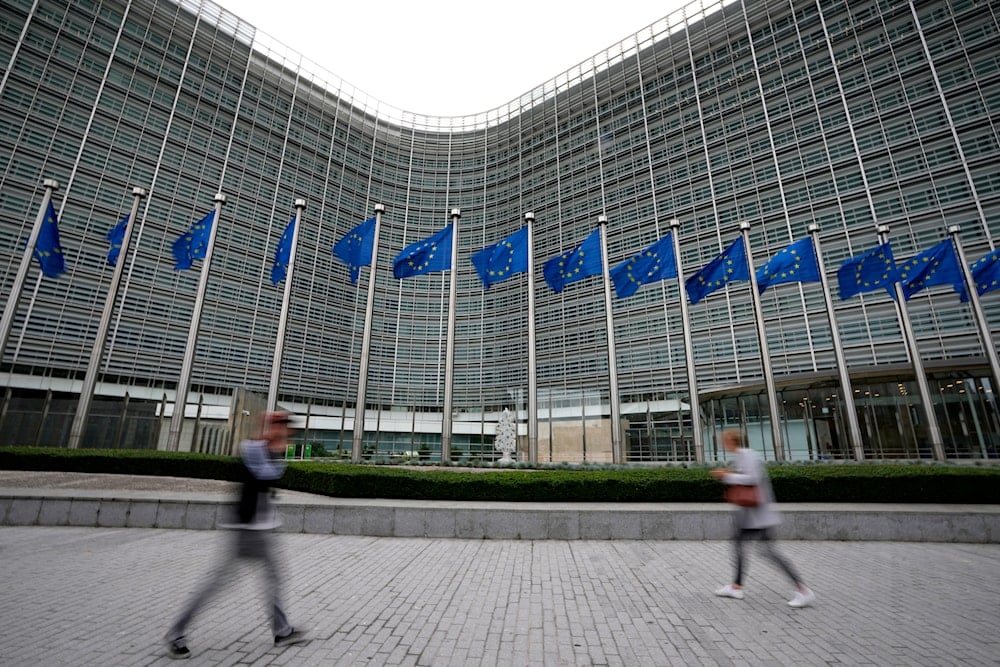EU gives staff burner phones in fear of US espionage: FT
The European Union is starting to treat the United States like an adversary, implementing security measures like using burner electronic devices that were previously used against EU foes like Russia and China.
-

European Union flags flap in the wind as pedestrians walk by EU headquarters in Brussels, on Wednesday, September 20, 2023. (AP)
The European Commission is taking precautions in the United States to avoid the risk of espionage by issuing burner phones and basic laptops to some of its US-bound staff, a measure that has traditionally been reserved for trips to China, according to the Financial Times.
Commissioners and senior officials traveling to the IMF and World Bank spring meetings next week have been given the new guidance, The Financial Times reported on Wednesday, citing four officials familiar with the matter.
The officials said that the measure of using burner devices replicates those used in Ukraine and China, where a standard IT kit could not be brought into the countries by EU staff for fear of espionage by Russian or Chinese agents. “They are worried about the US getting into the commission systems,” one official declared.
The treatment of the US as a potential security risk highlights how relations have deteriorated since the return of Donald Trump as US president in January, as he accused the EU of having been set up to “scr*w the US” and announced 20% so-called reciprocal tariffs on the bloc’s exports, which he later halved for a 90-day period.
“The transatlantic alliance is over,” a fifth European Union official stated.
'Washington an adversary'
While the Commission confirmed that it had recently updated its security advice for the US, it clarified that no specific written instructions were issued regarding the use of burner phones, adding that the bloc’s diplomatic service had been involved in the process as part of its routine role in such updates.
Officials stated that the guidance for all staff traveling to the US included a recommendation to turn off phones at the border and place them in special protective sleeves when unattended to prevent potential spying.
Luuk van Middelaar, director of the Brussels Institute for Geopolitics, told the Financial Times that while "Washington is not Beijing or Moscow, it is an adversary that is prone to use extra-legal methods to further its interests and power," adding that the security advice for US travel was unsurprising.
Van Middelaar pointed to allegations that the Obama administration spied on former German Chancellor Angela Merkel's phone in 2013, noting that "Democrat administrations use the same tactics" and calling the Commission's security measures an "acceptance of reality."
European tourists and academics have reportedly been denied entry to the US after border officials found social media posts or documents on their devices that criticized the Trump administration's policies.
Tensions between the European Union and its longtime ally, the United States, have escalated following President Trump's imposition of tariffs targeting the bloc, coupled with his repeated expressions of disdain toward the EU.
Trump's tariffs sour relations with the EU
US President Donald Trump announced reciprocal tariffs on April 2, which he dubbed "Liberation Day", consisting of a base 10% tariff on all exports to the United States, and targeted levies on more than 180 countries: The European Union was hit with a 20% tariff.
On April 9, the European Union announced plans to impose tariffs on over $20 billion worth of US exports in retaliation against Trump's earlier 25% tariffs on metals imports, though it later reversed this decision after Trump backtracked and suspended all tariffs except those targeting China.
The European Union's retaliation to the newly imposed 20% tariff by the United States on the bloc may not be limited to reciprocal duties on American imports, French Economy Minister Eric Lombard said on April 11.
"We are working on a response package that could indeed go beyond customs duties to bring the Americans to the negotiating table and reach a balanced agreement..." Lombard told RMC Radio on April 11, adding that the EU's response can be firm without mirroring the US approach, as tariffs on imports from the US could harm the bloc.
The minister called on French companies to demonstrate solidarity and patriotism in the face of the US measures while stressing that Europe must stand its ground against global powers "because we are now in a period of confrontation against the planet’s major blocs: the US, Russia, and China. Europe has what it takes to rise to the occasion, but it requires effort."
Previously, on Thursday, French President Emmanuel Macron urged national companies to halt any investments in the US until greater clarity emerges regarding the specifics of Trump's proposed tariffs, as the world prepares to go to a trade war with the US over its tariff bombardment policy.
"The consequences will be dire for millions of people around the globe," EU Chief Ursula von der Leyen said in a statement on April 9, adding that the European Union is planning on retaliating against the levies imposed by Trump should talks with the US falter. The European Union was hit with a 20% reciprocal tariff.

 5 Min Read
5 Min Read










